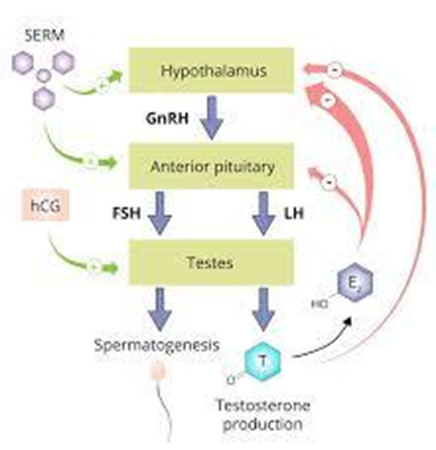Which of the following glands regulates the release of the hormone testosterone?
Parathyroid
Posterior pituitary
Thyroid
Anterior pituitary
The Correct Answer is D
a. Parathyroid: Parathyroid glands regulate calcium levels in the blood, not testosterone.
b. Posterior pituitary: The posterior pituitary gland stores and releases hormones produced in the hypothalamus, not testosterone.
c. Thyroid: The thyroid gland produces thyroid hormones, not testosterone.
d. Anterior pituitary: The anterior pituitary gland produces gonadotropin-releasing hormone (GnRH), which stimulates the testes to produce testosterone in males.

Nursing Test Bank
Naxlex Comprehensive Predictor Exams
Related Questions
Correct Answer is B
Explanation
a: Receptor - Receptors are proteins that bind to signaling molecules (ligands) outside the cell and initiate cellular responses but do not typically facilitate ion movement.
b. Channel-Integral membrane proteins called ion channels create pores in the cell membrane, allowing specific ions to pass through, thus facilitating ion movement into or out of the cell.
c: Ligand - Ligands are signaling molecules that bind to receptors, activating them, but they do not facilitate ion movement.
d: Peripheral - Peripheral proteins are found on the surface of the cell membrane but are not typically involved in creating ion channels
Correct Answer is A
Explanation
a. QRS wave: The ECG (electrocardiogram) measures the electrical activity of the heart. The QRS complex represents ventricular depolarization, the spread of electrical excitation through the ventricles causing them to contract.

b. P wave: The P wave represents atrial depolarization, the electrical impulse moving through the atria.
c. T wave: The T wave represents ventricular repolarization, the ventricles relaxing after contraction.
d. U wave: The U wave is a small wave of uncertain origin, not related to ventricular depolarization.
Whether you are a student looking to ace your exams or a practicing nurse seeking to enhance your expertise , our nursing education contents will empower you with the confidence and competence to make a difference in the lives of patients and become a respected leader in the healthcare field.
Visit Naxlex, invest in your future and unlock endless possibilities with our unparalleled nursing education contents today
Report Wrong Answer on the Current Question
Do you disagree with the answer? If yes, what is your expected answer? Explain.
Kindly be descriptive with the issue you are facing.
